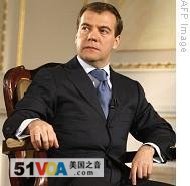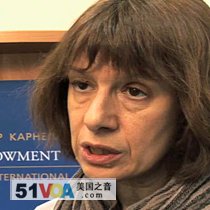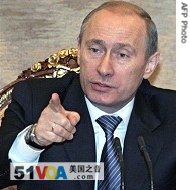Moscow
05 May 2009
 |
| Dmitri Medvedev |
Dmitri Medvedev took the oath of office on May 7, 2008. He was handed the briefcase containing Russia's strategic nuclear codes, and made his first of many promises to help develop the country's economy and civil rights. Within two hours, he had also nominated his predecessor and mentor, Vladimir Putin, as prime minister.
One year later, Mr. Medvedev's legislative record is scant. His most significant contribution was a constitutional amendment that extended the presidential term of office - a move seen by some as benefiting Mr. Putin, who is seen as angling for a return to the presidency.
Critics such as Communist Party Chief Gennady Zyuganov are wary of the Russian president.
Zyuganov says Mr. Medvedev has made a lot of encouraging announcements, from fighting corruption to the necessity of dialogue, even introducing a draft bill which grants (television) time to the opposition. But the politician says real implementation of the president's announcements by the government, the ministers, governors or regional authorities shows quite the opposite.
Mr. Medvedev has won cautious praise for talking about democratic reforms, and meeting with human rights activists, but they note police continue to harass them.
 |
| Masha Lipman |
"The message more or less is, if you have critical ideas, come to me and tell me that," said Masha Lipman. "Don't disturb the public, don't try to stir unwelcome sentiments among the public."
During last year's presidential campaign, Vladimir Putin said Dmitri Medvedev would continue his administration's successful economic policies. The Russian stock market responded to Mr. Medvedev reaching a two-week high on inauguration day. But since then, the economy has plummeted. While acknowledging Russia's poor economic diversification and inadequate financial system, Mr. Putin says responsibility for the crisis lies abroad, not with Russian leaders.
 |
| Vladimir Putin presides over cabinet meeting in Moscow, 21 Apr 2008 |
So, who is in charge of Russia? Mr. Medvedev took the question at a news conference the day after his election on March 1, 2008.
His response was that under the constitution of the Russian Federation, foreign policy is determined by the president.
But during Russia's greatest foreign crisis of the past year, the Georgian conflict in August, it was Prime Minister Putin, not President Medvedev, who flew just north of the conflict zone to maintain morale and give orders.
Masha Lipman says power in Russia is based not on governmental institutions, but on informal, behind-the scenes arrangements.
"Who appointed whom? Who owes what to whom? Who is whose client? Where are people's loyalties?," she asks.
Lipman adds that although Vladimir Putin in no longer president, he has succeeded in keeping political power by maintaining control over Russia's most sensitive agencies, including the military and state security.
A recent survey by the Canadian GlobeScan Agency for BBC's Russian Service indicates only 15 percent of Russians believe Mr. Medvedev holds real power. This is three percent higher than Moscow's Levada Center poll in February.
Both polls indicate roughly 50 percent of Russians think the president and prime minister share power equally.